Thanks to aluminum body panels and a new, lighter EcoBoost engine, Ford's new '15 F-150 weighs less, which is advantageous for fuel efficiency and reduced overhead expenses on a work truck. However, any pickup accustomed to routine towing or fitted with a bed rack that carries a lot of weight up high could use some stability and handling improvement.
Correcting this top-heavy tendency is a fairly simple matter of adding a substantial sway bar to the rear suspension (which the new F-150 doesn't come with from the factory). As any student of auto mechanics already knows, a sway bar increases the suspension's resistance to roll (lean) in turns. It does so by connecting the left and right wheels together through short lever arms that are linked by a torsion spring (the sway bar).
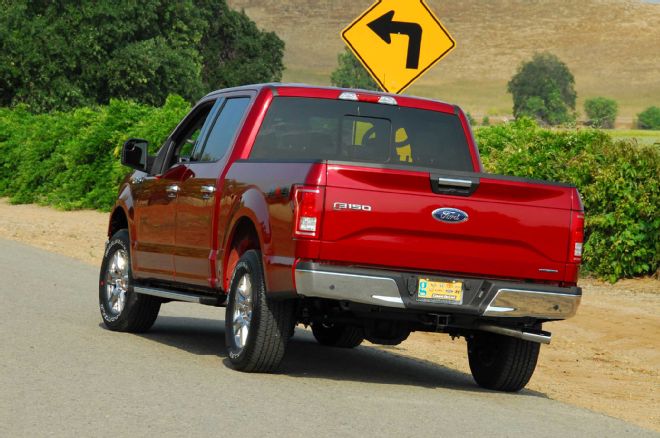
| 2015 Ford F150 Hellwig Rear Sway Bar Install
In a turn, a truck body typically drops down closer to the outer wheels (especially one with a heavy load on the bed rack). A sway bar forces the inner wheels to move closer to the vehicle by transferring forces from a heavily loaded axle to the opposite side. As a result, the vehicle hugs the turn tighter and stays more level with the road, keeping your load more even and improving cornering control. The use of sway bars reduces body roll without making the suspension's springs stiffer, which might otherwise make for a harsh ride.
When it comes to controlling both rock and roll, Hellwig Products is a veteran in the field, as it has offered suspension upgrades since 1946. Rudy Hellwig, the company's founder, started out by trying to solve a problem that occurred while the family was traveling back and forth from Kansas City to Glendale, California. Since they were often driving overloaded with their headlights pointing skyward, he figured out how to fix that with helper springs.
Hellwig sway bars are specifically designed and engineered to fit each vehicle make and model. They are made from heavy-duty 4140 chromoly steel that is hot-formed and heat-treated for optimum strength, durability, and performance. All kits can be bolted in with basic handtools—typically in less than a day (with no drilling or welding required). The package includes heavy-gauge mounting hardware, specially formulated polyurethane bushings, and illustrated instructions. For easier installation and proper adjustment of the bar, the weight of the vehicle must be on the suspension (as if you are driving down the road), so raise the truck using ramps or a rack, rather than jackstands or a frame lift.
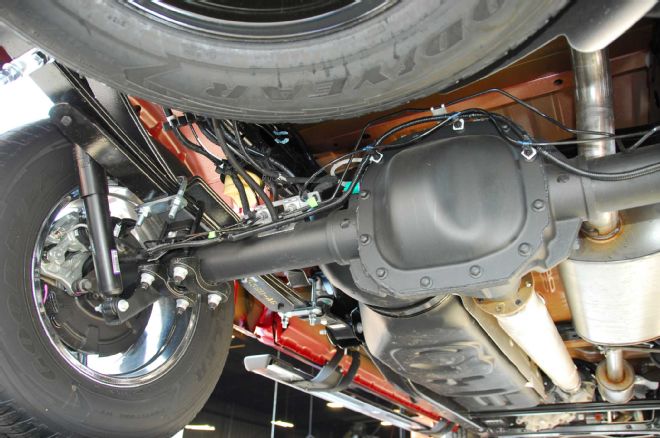
| 2015 Ford F150 Hellwig Rear Sway Bar Install F150 Undercarriage
Ford's new '15 F-150 has a sway bar up front but no stabilizer bar in the rear. Off-road enthusiasts probably prefer its absence for better articulation on rugged terrain, but a stabilizer bar is definitely a plus for a work truck that tows and hauls heavy loads.
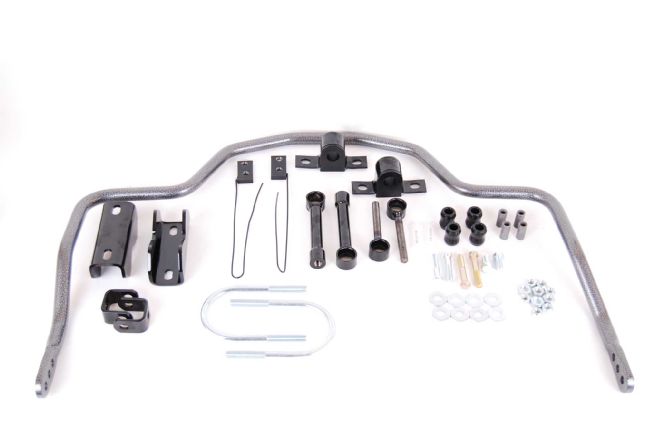
| 2015 Ford F150 Hellwig Rear Sway Bar Install Hellwig Rear Sway Bar Kit
The Hellwig rear sway bar (PN: 7743) fits both two-wheel-drive and four-wheel-drive '15 Ford F-150s. Its 1-inch-diameter, powdercoated bar is made from chromoly steel and has three mounting holes at each end to allow the driver to adjust the bar to his load or driving style. Since the F-150 doesn't come with a factory rear sway bar, the kit comes with all mounting hardware, including the axle clamps, endlinks, and polyurethane bushings.
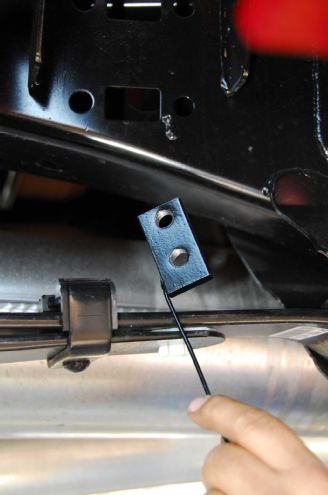
| 2015 Ford F150 Hellwig Rear Sway Bar Install Backing Plate
Install the threaded backing plates through holes in the framerail, using the attached wire to align them from inside the rail with the mounting bolt. On the driver side, the plate should be inserted into the hole between the brake lines.
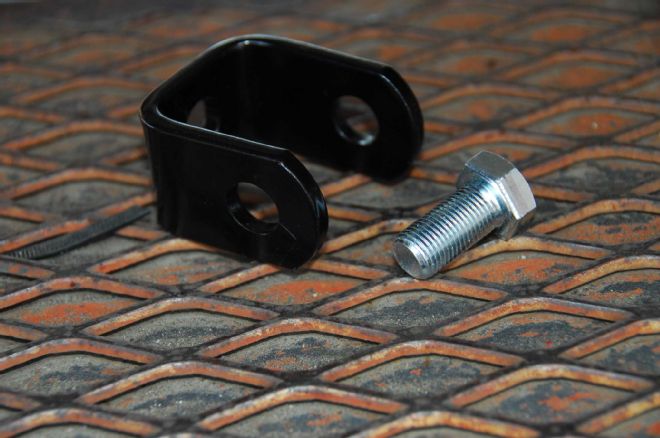
| 2015 Ford F150 Hellwig Rear Sway Bar Install Clevis
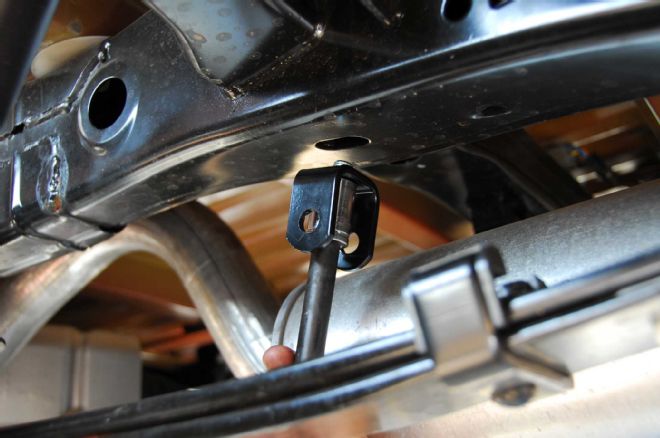
| 2015 Ford F150 Hellwig Rear Sway Bar Install Clevis Install
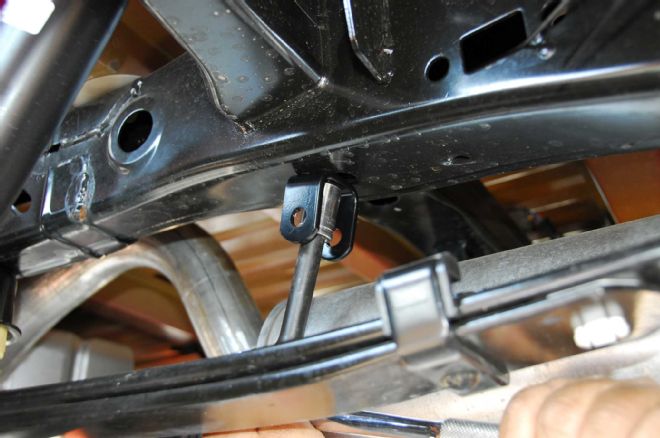
| 2015 Ford F150 Hellwig Rear Sway Bar Install Clevis Install
Attach the clevis to the threaded plate using the 1/2-20 x 1-inch bolts provided. Align the clevis and torque its bolt to 50 ft-lb of torque.
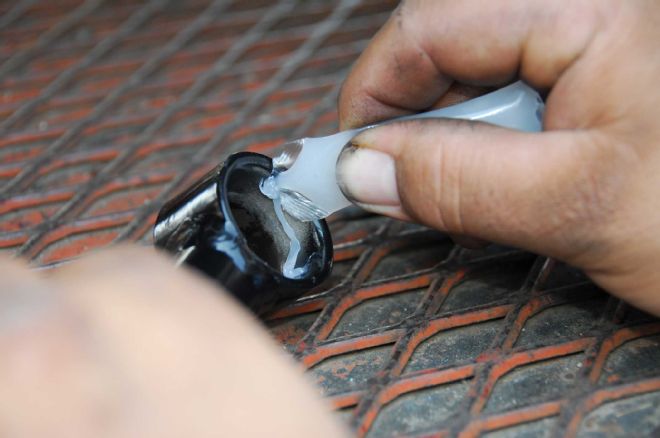
| 2015 Ford F150 Hellwig Rear Sway Bar Install Bushing Install
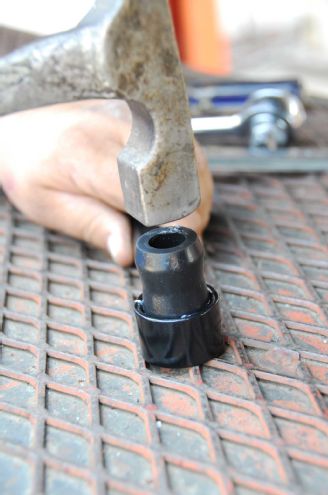
| 2015 Ford F150 Hellwig Rear Sway Bar Install Bushing Install
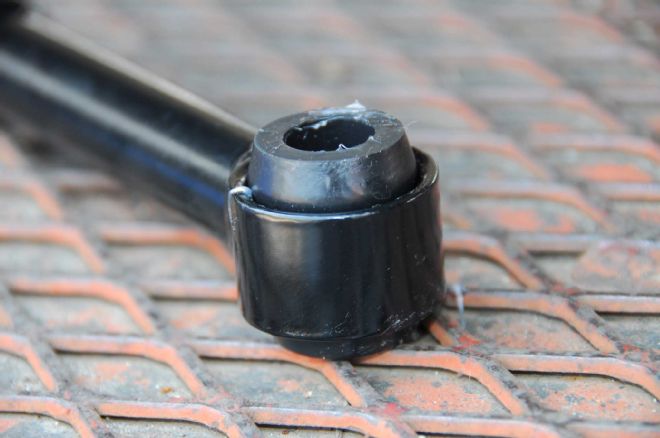
| 2015 Ford F150 Hellwig Rear Sway Bar Install Bushing Install
After applying the supplied lubricant, insert the hourglass-shaped bushings into the hoops of the endlinks, then tap gently into place.
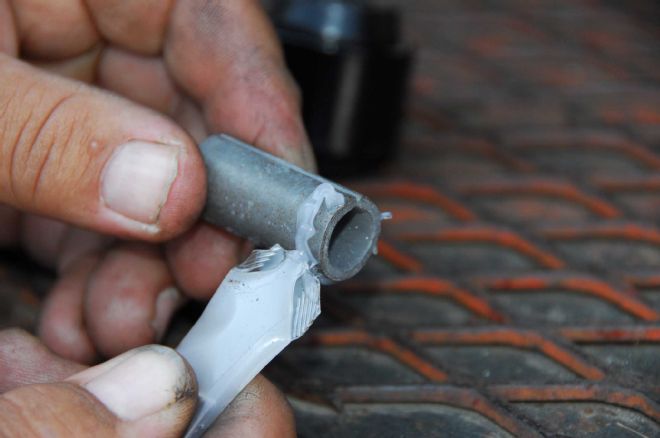
| 2015 Ford F150 Hellwig Rear Sway Bar Install Sleve
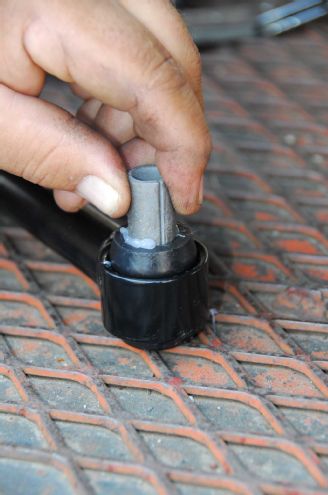
| 2015 Ford F150 Hellwig Rear Sway Bar Install Bushing Install
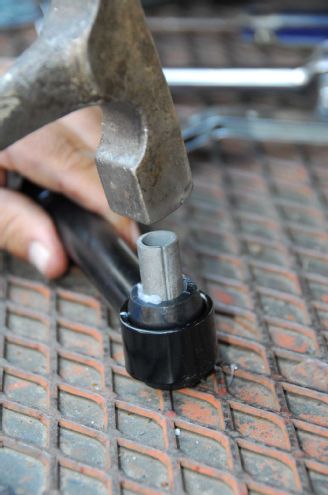
| 2015 Ford F150 Hellwig Rear Sway Bar Install Bushing Install
Apply lubricant to the sleeve as well, and install it in the hourglass bushing and tap into place.
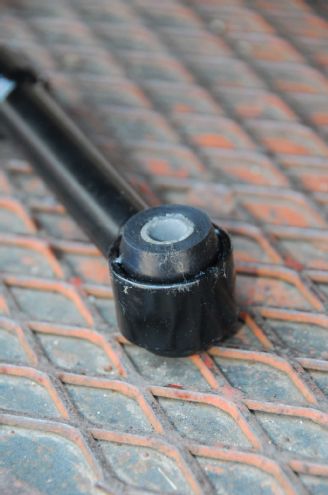
| 2015 Ford F150 Hellwig Rear Sway Bar Install Endlink
Here's how the endlink should look once both the bushing and sleeve are correctly installed.
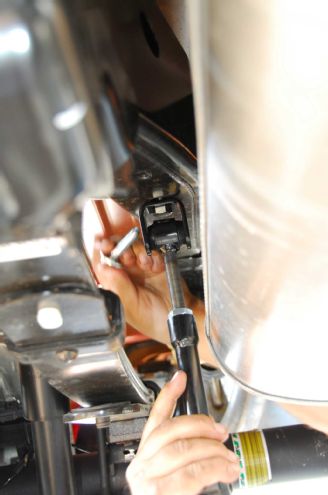
| 2015 Ford F150 Hellwig Rear Sway Bar Install Endlink
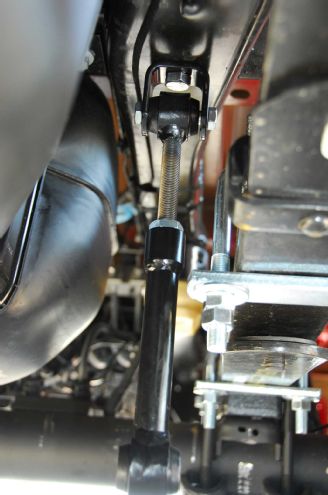
| 2015 Ford F150 Hellwig Rear Sway Bar Install Endlink
Assemble the endlinks with the 9/16-inch jam nut on the threaded portion of the endlink. Leave it loose for adjustment later and loosely attach the endlinks to the clevis using a 7/16-20 x 2 and 1/4-inch bolt and locknut.
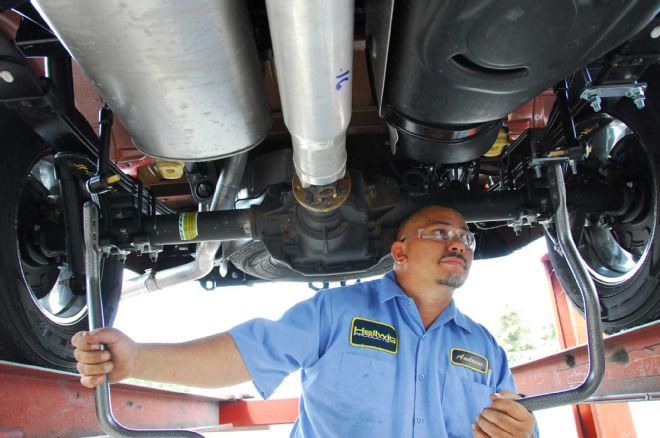
| 2015 Ford F150 Hellwig Rear Sway Bar Install Sway Bar
Lift the sway bar into place and attach it to the endlinks.
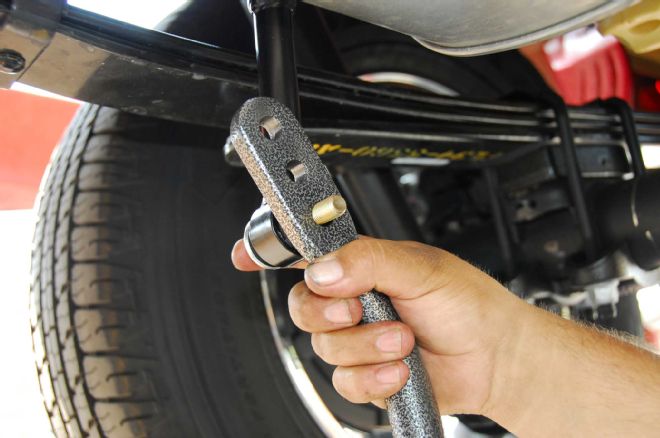
| 2015 Ford F150 Hellwig Rear Sway Bar Install Sway Bar End Hole
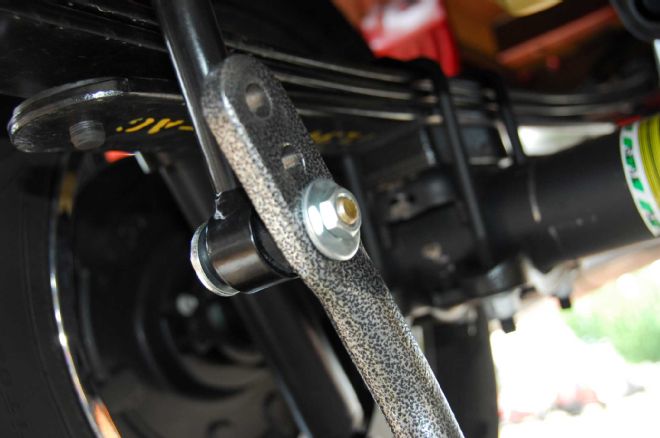
| 2015 Ford F150 Hellwig Rear Sway Bar Install Sway Bar End Hole
Attach the end hole of the sway bar to the endlinks using 7/16 x 23/4-inch bolts, washers, and locknuts. For the softest setting, use the hole at the end of the bar. To increase stiffness (depending on the load your work truck typically handles), reattach the bar using either the middle or upper hole.
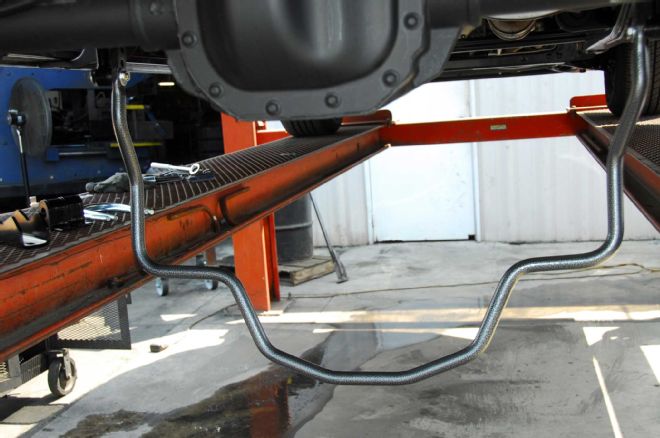
| 2015 Ford F150 Hellwig Rear Sway Bar Install U Bolt And Bushing Install
Let the sway bar hang down loosely while the U-bolts and bushings are being attached.
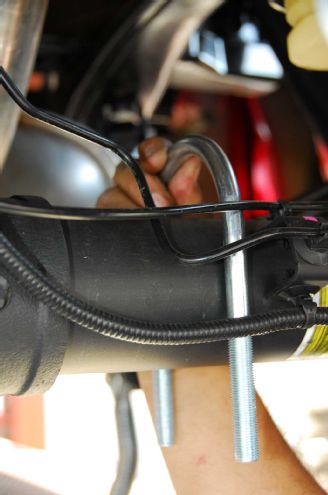
| 2015 Ford F150 Hellwig Rear Sway Bar Install U Bolt
Place the U-bolts over the axle in the approximate location, making sure to provide clearance for wiring and brake lines as shown.
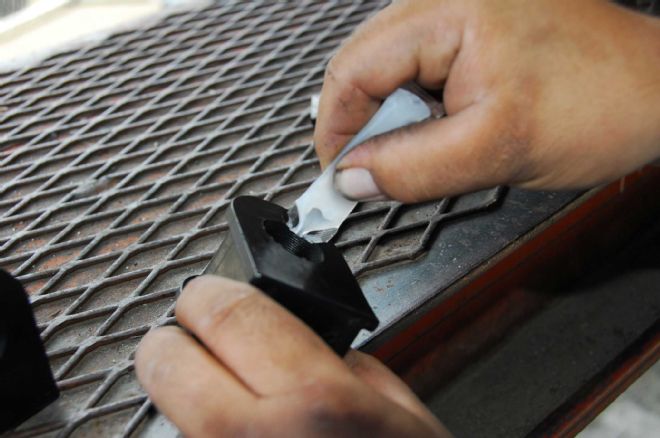
| 2015 Ford F150 Hellwig Rear Sway Bar Install Bushing Install
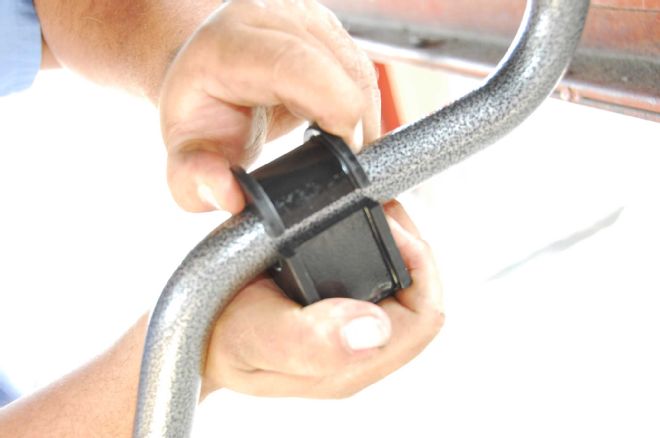
| 2015 Ford F150 Hellwig Rear Sway Bar Install Bushing Install
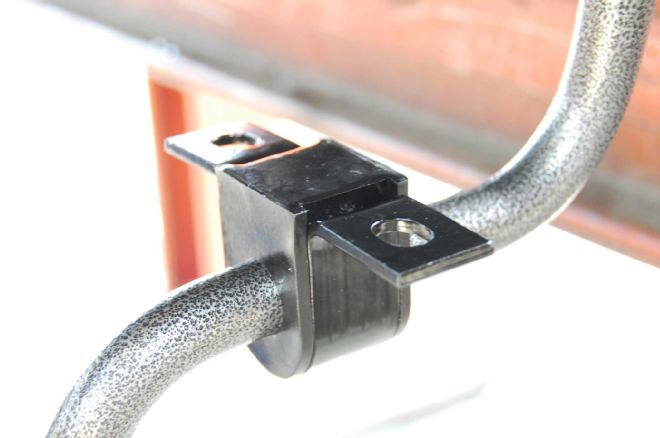
| 2015 Ford F150 Hellwig Rear Sway Bar Install Bushing Install
Lubricate and install the bushings as far outboard on the sway bar as possible, right against the outer bends of the bar, unless you're using this sway bar with a Hellwig air spring kit. In that case, the bushings should be installed as far inboard as possible, near the center bends of the bar.
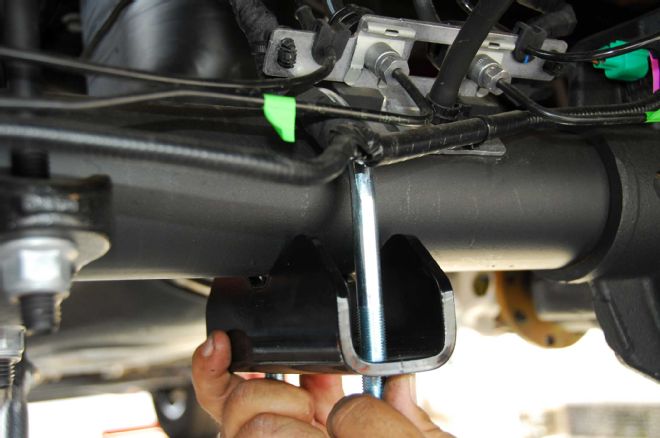
| 2015 Ford F150 Hellwig Rear Sway Bar Install U Bolt
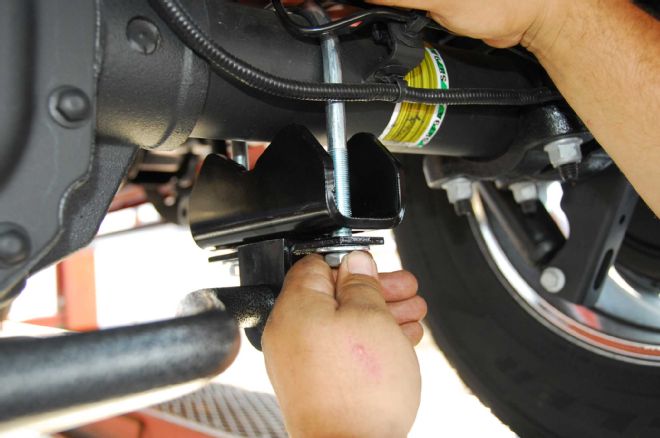
| 2015 Ford F150 Hellwig Rear Sway Bar Install U Bolt Install
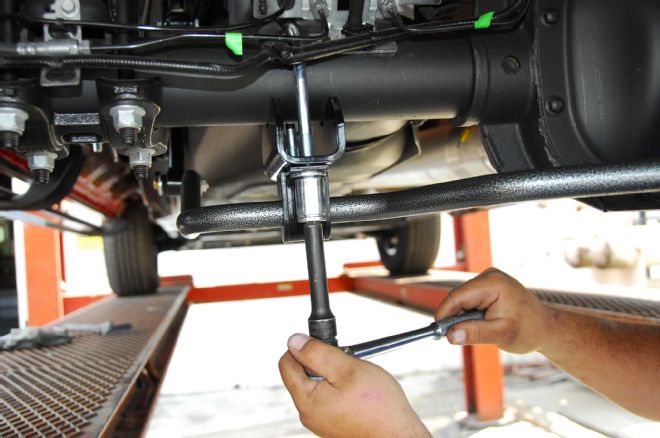
| 2015 Ford F150 Hellwig Rear Sway Bar Install U Bolt
Attach U-bolts to the axle, again making sure they are clear of any brake lines, wires, or hoses to avoid pinching or crushing them. (Note routing of the plastic-sheathed wiring loom.) Rotate the sway bar into position and attach it to the axle by placing the legs of the U-bolts through the holes in the saddle brackets and U-plates.
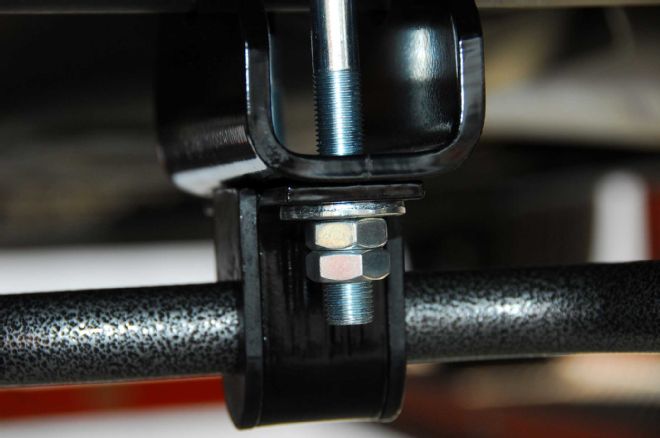
| 2015 Ford F150 Hellwig Rear Sway Bar Install Locknut
Fasten everything with the thick washers and 1/2-inch locknuts supplied. Leave it slightly loose for final adjustment.
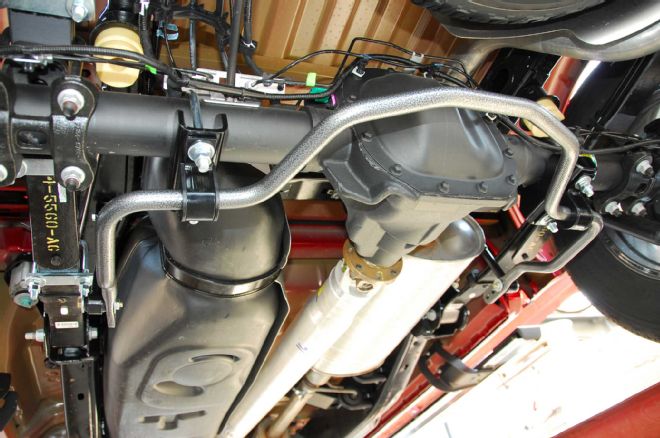
| 2015 Ford F150 Hellwig Rear Sway Bar Install Sway Bar Alignment
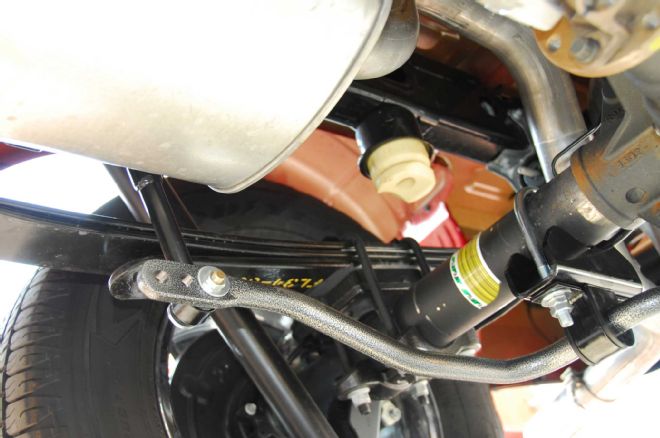
| 2015 Ford F150 Hellwig Rear Sway Bar Install Sway Bat Alignment
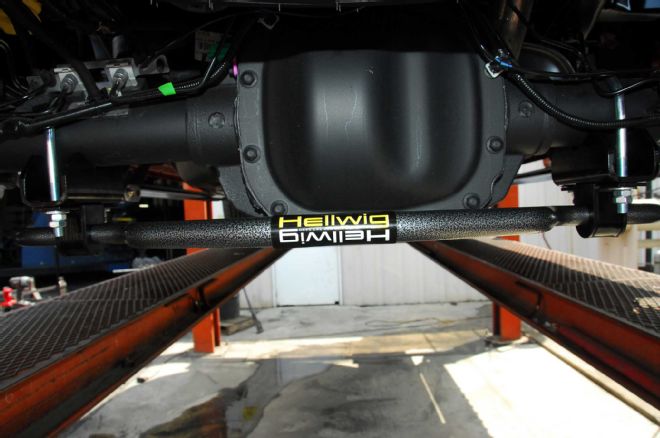
| 2015 Ford F150 Hellwig Rear Sway Bar Install
Align the sway bar so it's evenly mounted from side to side and check for clearance from all wires, lines, and hoses. Tighten all bolts and, after testdriving, recheck everything for tightness. You should notice an immediate difference in the cornering stability of your pickup—especially when the bed rack is heavily loaded or while you're towing a trailer.
 | 2015 Ford F150 Hellwig Rear Sway Bar Install
In a turn, a truck body typically drops down closer to the outer wheels (especially one with a heavy load on the bed rack). A sway bar forces the inner wheels to move closer to the vehicle by transferring forces from a heavily loaded axle to the opposite side. As a result, the vehicle hugs the turn tighter and stays more level with the road, keeping your load more even and improving cornering control. The use of sway bars reduces body roll without making the suspension's springs stiffer, which might otherwise make for a harsh ride.
When it comes to controlling both rock and roll, Hellwig Products is a veteran in the field, as it has offered suspension upgrades since 1946. Rudy Hellwig, the company's founder, started out by trying to solve a problem that occurred while the family was traveling back and forth from Kansas City to Glendale, California. Since they were often driving overloaded with their headlights pointing skyward, he figured out how to fix that with helper springs.
Hellwig sway bars are specifically designed and engineered to fit each vehicle make and model. They are made from heavy-duty 4140 chromoly steel that is hot-formed and heat-treated for optimum strength, durability, and performance. All kits can be bolted in with basic handtools—typically in less than a day (with no drilling or welding required). The package includes heavy-gauge mounting hardware, specially formulated polyurethane bushings, and illustrated instructions. For easier installation and proper adjustment of the bar, the weight of the vehicle must be on the suspension (as if you are driving down the road), so raise the truck using ramps or a rack, rather than jackstands or a frame lift.
| 2015 Ford F150 Hellwig Rear Sway Bar Install
In a turn, a truck body typically drops down closer to the outer wheels (especially one with a heavy load on the bed rack). A sway bar forces the inner wheels to move closer to the vehicle by transferring forces from a heavily loaded axle to the opposite side. As a result, the vehicle hugs the turn tighter and stays more level with the road, keeping your load more even and improving cornering control. The use of sway bars reduces body roll without making the suspension's springs stiffer, which might otherwise make for a harsh ride.
When it comes to controlling both rock and roll, Hellwig Products is a veteran in the field, as it has offered suspension upgrades since 1946. Rudy Hellwig, the company's founder, started out by trying to solve a problem that occurred while the family was traveling back and forth from Kansas City to Glendale, California. Since they were often driving overloaded with their headlights pointing skyward, he figured out how to fix that with helper springs.
Hellwig sway bars are specifically designed and engineered to fit each vehicle make and model. They are made from heavy-duty 4140 chromoly steel that is hot-formed and heat-treated for optimum strength, durability, and performance. All kits can be bolted in with basic handtools—typically in less than a day (with no drilling or welding required). The package includes heavy-gauge mounting hardware, specially formulated polyurethane bushings, and illustrated instructions. For easier installation and proper adjustment of the bar, the weight of the vehicle must be on the suspension (as if you are driving down the road), so raise the truck using ramps or a rack, rather than jackstands or a frame lift.
 | 2015 Ford F150 Hellwig Rear Sway Bar Install F150 Undercarriage
Ford's new '15 F-150 has a sway bar up front but no stabilizer bar in the rear. Off-road enthusiasts probably prefer its absence for better articulation on rugged terrain, but a stabilizer bar is definitely a plus for a work truck that tows and hauls heavy loads.
| 2015 Ford F150 Hellwig Rear Sway Bar Install F150 Undercarriage
Ford's new '15 F-150 has a sway bar up front but no stabilizer bar in the rear. Off-road enthusiasts probably prefer its absence for better articulation on rugged terrain, but a stabilizer bar is definitely a plus for a work truck that tows and hauls heavy loads.
 | 2015 Ford F150 Hellwig Rear Sway Bar Install Hellwig Rear Sway Bar Kit
The Hellwig rear sway bar (PN: 7743) fits both two-wheel-drive and four-wheel-drive '15 Ford F-150s. Its 1-inch-diameter, powdercoated bar is made from chromoly steel and has three mounting holes at each end to allow the driver to adjust the bar to his load or driving style. Since the F-150 doesn't come with a factory rear sway bar, the kit comes with all mounting hardware, including the axle clamps, endlinks, and polyurethane bushings.
| 2015 Ford F150 Hellwig Rear Sway Bar Install Hellwig Rear Sway Bar Kit
The Hellwig rear sway bar (PN: 7743) fits both two-wheel-drive and four-wheel-drive '15 Ford F-150s. Its 1-inch-diameter, powdercoated bar is made from chromoly steel and has three mounting holes at each end to allow the driver to adjust the bar to his load or driving style. Since the F-150 doesn't come with a factory rear sway bar, the kit comes with all mounting hardware, including the axle clamps, endlinks, and polyurethane bushings.
 | 2015 Ford F150 Hellwig Rear Sway Bar Install Backing Plate
Install the threaded backing plates through holes in the framerail, using the attached wire to align them from inside the rail with the mounting bolt. On the driver side, the plate should be inserted into the hole between the brake lines.
| 2015 Ford F150 Hellwig Rear Sway Bar Install Backing Plate
Install the threaded backing plates through holes in the framerail, using the attached wire to align them from inside the rail with the mounting bolt. On the driver side, the plate should be inserted into the hole between the brake lines.
 | 2015 Ford F150 Hellwig Rear Sway Bar Install Clevis
| 2015 Ford F150 Hellwig Rear Sway Bar Install Clevis
 | 2015 Ford F150 Hellwig Rear Sway Bar Install Clevis Install
| 2015 Ford F150 Hellwig Rear Sway Bar Install Clevis Install
 | 2015 Ford F150 Hellwig Rear Sway Bar Install Clevis Install
Attach the clevis to the threaded plate using the 1/2-20 x 1-inch bolts provided. Align the clevis and torque its bolt to 50 ft-lb of torque.
| 2015 Ford F150 Hellwig Rear Sway Bar Install Clevis Install
Attach the clevis to the threaded plate using the 1/2-20 x 1-inch bolts provided. Align the clevis and torque its bolt to 50 ft-lb of torque.
 | 2015 Ford F150 Hellwig Rear Sway Bar Install Bushing Install
| 2015 Ford F150 Hellwig Rear Sway Bar Install Bushing Install
 | 2015 Ford F150 Hellwig Rear Sway Bar Install Bushing Install
| 2015 Ford F150 Hellwig Rear Sway Bar Install Bushing Install
 | 2015 Ford F150 Hellwig Rear Sway Bar Install Bushing Install
After applying the supplied lubricant, insert the hourglass-shaped bushings into the hoops of the endlinks, then tap gently into place.
| 2015 Ford F150 Hellwig Rear Sway Bar Install Bushing Install
After applying the supplied lubricant, insert the hourglass-shaped bushings into the hoops of the endlinks, then tap gently into place.
 | 2015 Ford F150 Hellwig Rear Sway Bar Install Sleve
| 2015 Ford F150 Hellwig Rear Sway Bar Install Sleve
 | 2015 Ford F150 Hellwig Rear Sway Bar Install Bushing Install
| 2015 Ford F150 Hellwig Rear Sway Bar Install Bushing Install
 | 2015 Ford F150 Hellwig Rear Sway Bar Install Bushing Install
Apply lubricant to the sleeve as well, and install it in the hourglass bushing and tap into place.
| 2015 Ford F150 Hellwig Rear Sway Bar Install Bushing Install
Apply lubricant to the sleeve as well, and install it in the hourglass bushing and tap into place.
 | 2015 Ford F150 Hellwig Rear Sway Bar Install Endlink
Here's how the endlink should look once both the bushing and sleeve are correctly installed.
| 2015 Ford F150 Hellwig Rear Sway Bar Install Endlink
Here's how the endlink should look once both the bushing and sleeve are correctly installed.
 | 2015 Ford F150 Hellwig Rear Sway Bar Install Endlink
| 2015 Ford F150 Hellwig Rear Sway Bar Install Endlink
 | 2015 Ford F150 Hellwig Rear Sway Bar Install Endlink
Assemble the endlinks with the 9/16-inch jam nut on the threaded portion of the endlink. Leave it loose for adjustment later and loosely attach the endlinks to the clevis using a 7/16-20 x 2 and 1/4-inch bolt and locknut.
| 2015 Ford F150 Hellwig Rear Sway Bar Install Endlink
Assemble the endlinks with the 9/16-inch jam nut on the threaded portion of the endlink. Leave it loose for adjustment later and loosely attach the endlinks to the clevis using a 7/16-20 x 2 and 1/4-inch bolt and locknut.
 | 2015 Ford F150 Hellwig Rear Sway Bar Install Sway Bar
Lift the sway bar into place and attach it to the endlinks.
| 2015 Ford F150 Hellwig Rear Sway Bar Install Sway Bar
Lift the sway bar into place and attach it to the endlinks.
 | 2015 Ford F150 Hellwig Rear Sway Bar Install Sway Bar End Hole
| 2015 Ford F150 Hellwig Rear Sway Bar Install Sway Bar End Hole
 | 2015 Ford F150 Hellwig Rear Sway Bar Install Sway Bar End Hole
Attach the end hole of the sway bar to the endlinks using 7/16 x 23/4-inch bolts, washers, and locknuts. For the softest setting, use the hole at the end of the bar. To increase stiffness (depending on the load your work truck typically handles), reattach the bar using either the middle or upper hole.
| 2015 Ford F150 Hellwig Rear Sway Bar Install Sway Bar End Hole
Attach the end hole of the sway bar to the endlinks using 7/16 x 23/4-inch bolts, washers, and locknuts. For the softest setting, use the hole at the end of the bar. To increase stiffness (depending on the load your work truck typically handles), reattach the bar using either the middle or upper hole.
 | 2015 Ford F150 Hellwig Rear Sway Bar Install U Bolt And Bushing Install
Let the sway bar hang down loosely while the U-bolts and bushings are being attached.
| 2015 Ford F150 Hellwig Rear Sway Bar Install U Bolt And Bushing Install
Let the sway bar hang down loosely while the U-bolts and bushings are being attached.
 | 2015 Ford F150 Hellwig Rear Sway Bar Install U Bolt
Place the U-bolts over the axle in the approximate location, making sure to provide clearance for wiring and brake lines as shown.
| 2015 Ford F150 Hellwig Rear Sway Bar Install U Bolt
Place the U-bolts over the axle in the approximate location, making sure to provide clearance for wiring and brake lines as shown.
 | 2015 Ford F150 Hellwig Rear Sway Bar Install Bushing Install
| 2015 Ford F150 Hellwig Rear Sway Bar Install Bushing Install
 | 2015 Ford F150 Hellwig Rear Sway Bar Install Bushing Install
| 2015 Ford F150 Hellwig Rear Sway Bar Install Bushing Install
 | 2015 Ford F150 Hellwig Rear Sway Bar Install Bushing Install
Lubricate and install the bushings as far outboard on the sway bar as possible, right against the outer bends of the bar, unless you're using this sway bar with a Hellwig air spring kit. In that case, the bushings should be installed as far inboard as possible, near the center bends of the bar.
| 2015 Ford F150 Hellwig Rear Sway Bar Install Bushing Install
Lubricate and install the bushings as far outboard on the sway bar as possible, right against the outer bends of the bar, unless you're using this sway bar with a Hellwig air spring kit. In that case, the bushings should be installed as far inboard as possible, near the center bends of the bar.
 | 2015 Ford F150 Hellwig Rear Sway Bar Install U Bolt
| 2015 Ford F150 Hellwig Rear Sway Bar Install U Bolt
 | 2015 Ford F150 Hellwig Rear Sway Bar Install U Bolt Install
| 2015 Ford F150 Hellwig Rear Sway Bar Install U Bolt Install
 | 2015 Ford F150 Hellwig Rear Sway Bar Install U Bolt
Attach U-bolts to the axle, again making sure they are clear of any brake lines, wires, or hoses to avoid pinching or crushing them. (Note routing of the plastic-sheathed wiring loom.) Rotate the sway bar into position and attach it to the axle by placing the legs of the U-bolts through the holes in the saddle brackets and U-plates.
| 2015 Ford F150 Hellwig Rear Sway Bar Install U Bolt
Attach U-bolts to the axle, again making sure they are clear of any brake lines, wires, or hoses to avoid pinching or crushing them. (Note routing of the plastic-sheathed wiring loom.) Rotate the sway bar into position and attach it to the axle by placing the legs of the U-bolts through the holes in the saddle brackets and U-plates.
 | 2015 Ford F150 Hellwig Rear Sway Bar Install Locknut
Fasten everything with the thick washers and 1/2-inch locknuts supplied. Leave it slightly loose for final adjustment.
| 2015 Ford F150 Hellwig Rear Sway Bar Install Locknut
Fasten everything with the thick washers and 1/2-inch locknuts supplied. Leave it slightly loose for final adjustment.
 | 2015 Ford F150 Hellwig Rear Sway Bar Install Sway Bar Alignment
| 2015 Ford F150 Hellwig Rear Sway Bar Install Sway Bar Alignment
 | 2015 Ford F150 Hellwig Rear Sway Bar Install Sway Bat Alignment
| 2015 Ford F150 Hellwig Rear Sway Bar Install Sway Bat Alignment
 | 2015 Ford F150 Hellwig Rear Sway Bar Install
Align the sway bar so it's evenly mounted from side to side and check for clearance from all wires, lines, and hoses. Tighten all bolts and, after testdriving, recheck everything for tightness. You should notice an immediate difference in the cornering stability of your pickup—especially when the bed rack is heavily loaded or while you're towing a trailer.
| 2015 Ford F150 Hellwig Rear Sway Bar Install
Align the sway bar so it's evenly mounted from side to side and check for clearance from all wires, lines, and hoses. Tighten all bolts and, after testdriving, recheck everything for tightness. You should notice an immediate difference in the cornering stability of your pickup—especially when the bed rack is heavily loaded or while you're towing a trailer.